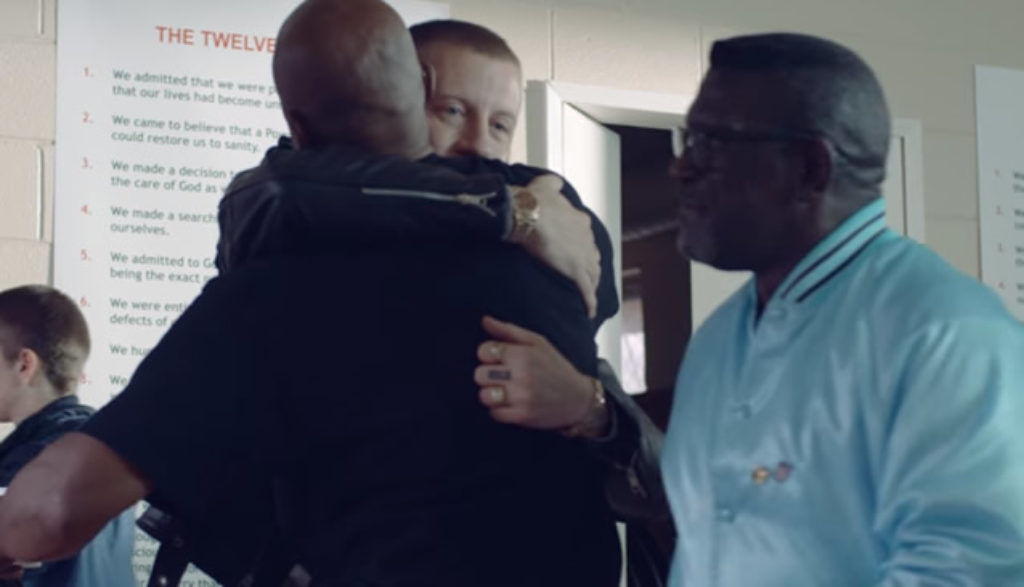
Plenty of rap songs have dealt with drugs over the years—both using them and selling them. But if you’re looking for a list of mainstream hip-hop icons who’ve actually critiqued drug use and addiction, well, that’s a shorter list.
“Drug Dealer,” the latest song from Seattle rapper Macklemore (with an assist from his producing partner, Ryan Lewis, and help on the chorus from guest singer Ariana DeBoo), does exactly that, drawing on the rapper’s well-chronicled battles with prescription painkillers.
Macklemore knows firsthand what it means to be caught in the vice grip of prescription drug abuse. The second verse paints a raw portrait of what trying to kick the habit looks like. Specifically, Macklemore documents the agony of withdrawal: “And these devils, they keep on talkin’ to me/They screamin’, ‘Open the bottle,’ I wanna be at peace.”
We witness Macklemore’s deeply personal battle with his “devils” as he walks across the knife edge of temptation: “Tryin’ close my eyes, but I keep sweatin’ through these sheets, through these sheets/Four horsemen, they won’t let me forget.” And perhaps he even gives in: “I said I’d never use a needle, but sure, f— it/I’m caught up, I’m on one, I’m nauseous/No options, exhausted.” And the description he gives of himself in that moment is a grim, cautionary one indeed: “Walkin’ carcass, I lost everything I wanted/My blinds drawn, too gone to leave this apartment.”
Toward the end of the song, Macklemore namechecks a list of other prescription medications (“Percocet, Actavis, Ambien, Adderall, Xanax binge”), then says these pharmacological “friends” are anything but: “Best friends with the thing that’s killing me/Enemies with my best friend, there’s no healing me.”
The similarly unvarnished video pictures Macklemore in the throes of this personal battle. We see him (from the side) sitting naked in a shower with a his hands on his face. Other shots picture him tossing, turning and sweating profusely in his bed, as well as smoking and vomiting in a bucket. An artistic representation of addiction’s overwhelming potency shows guest singer Ariana DeBoo’s face slowly being buried in prescription pills as she sings.
In addition to these autobiographical lyrics, Macklemore laments a long litany of celebrities who’ve succumbed to their own battles with drugs or alcohol: “That’s Prince, Michael and Whitney, that’s Amy, Ledger and Pimp C.” He says he could have been on the list as well: “I could have been gone, out 30s, faded in that tub.”
Macklemore also mourns the loss of a least one non-celeb friend to drugs (“They said it wasn’t a gateway drug/My homie was takin’ subs, and he ain’t wake up”) and notes that this isn’t just an urban problem (“It just moved out about the city/And spread out to the ‘burbs”).
When it comes to who’s responsible for prescription drugs’ collateral cultural damage, Macklemore does not mince words: shady doctors and greedy drug companies, he says, with an assist from the government. He says of pharmaceutical executives, “These billionaires, they kicked up/Paying out Congress so we take their drugs/Murderers who will never face the judge/ … G–d–n, they made a killing.”
And in the song’s chorus, Ariana DeBoo connects these accusatory dots even more bluntly: “My drug dealer was a doctor, doctor/Had the plug from Big Pharma, Pharma/ … He tried to kill me for a dollar, dollar.”
Addiction to prescription medication is a well-documented and growing problem in our society. And unlike so many rappers who romanticize drug use and never hint at the true cost of addiction, Macklemore’s lyrics and video poignantly (if profanely) forces us to face it. Kudos to him for not glamorizing and glorifying drug use as so many other rappers have done, but for artistically depicting the ugly ravages of addiction instead.
That said, I struggle with the implication that greedy doctors are main culprit in this societal scourge, that they’re somehow intentionally hooking their patients on painkillers for the sake of money. This seems like a gross oversimplification of a complex cultural problem to me. Writing for rawstory.com, Carl Hart and Kristen Gwynne say of this song,
“Yes, it’s true that some physicians engage in unethical practices, such as overprescribing opioids and other medications. But to be clear, this group represents a small minority, and medical boards and committees work diligently to weed them out. Further, the majority of people who use opioids chaotically or addictively ## do not obtain them from their doctor; the largest group obtain them instead from relatives or friends.” (Emphasis theirs.)
So even as Macklemore admirably shines a light on this important subject, he also perhaps inadvertently reinforces a victim narrative that places responsibility for prescription drug addiction mostly on the shoulders of nefarious doctors and greedy drug company executives. In doing so, a key link in this addictive chain, the easy availability of many of these drugs from friends and family’s medicine cabinets, gets overlooked completely.
But Macklemore isn’t done yet.
The Seattle musician has said he usually tries to find an Alcoholics Anonymous meeting to attend when he’s on tour. Accordingly, the video ends with him attending such a gathering, even hugging one of the other participants. And the song concludes with the so-called Serenity Prayer, a supplication penned by theologian Reinhold Niebuhr and used by Alcoholics Anonymous: “So God grant me the serenity to accept the things I cannot change/Courage to change the things I can/And the wisdom to know the difference.”
That seems an appropriate and inspiring way to end this gritty, honest, sometimes profane song—one that’s got some problems, but which nonetheless shines a light on an the important issue of prescription medication abuse.

After serving as an associate editor at NavPress’ Discipleship Journal and consulting editor for Current Thoughts and Trends, Adam now oversees the editing and publishing of Plugged In’s reviews as the site’s director. He and his wife, Jennifer, have three children. In their free time, the Holzes enjoy playing games, a variety of musical instruments, swimming and … watching movies.